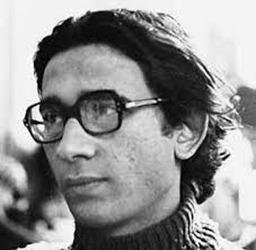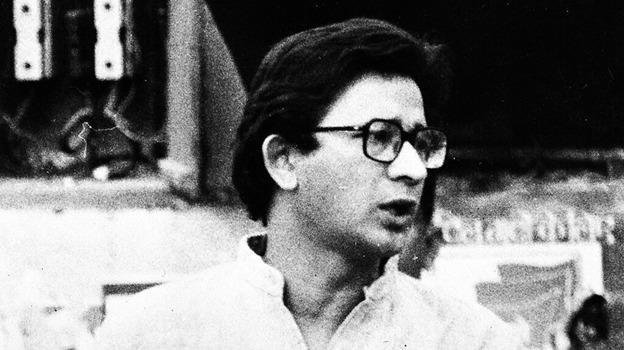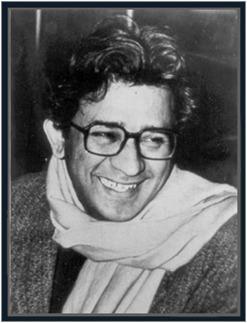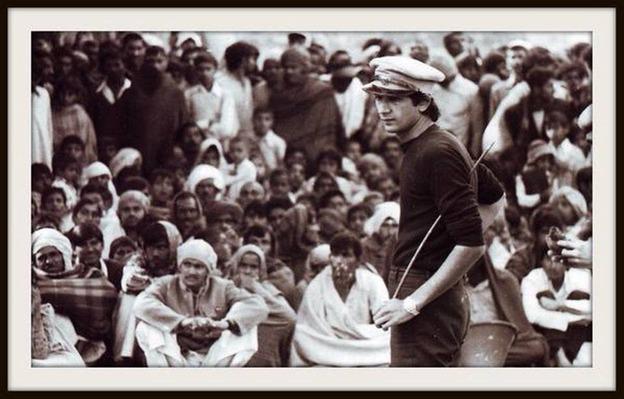Candle in the night!
Art is not a mirror held up to reality but a hammer with which to shape it- For a generation that has grown-up without knowing Safdar Hashmi, it is important to write about his passion, humour, understanding of resistance and the courage to put it into practice. The ideas that Safdar Hashmi grappled with during a period of tumult and change in India in the seventies are harbingers of the society we are today. Martin Luther King, jr said, "One has a moral responsibility to disobey unjust laws". "To sin by silence, when they should protest, makes cowards of men". Safdar Hashmi genuinely believed that artists have a social responsibility, and the logic of that responsibility led him to Marxism. It is perhaps only inevitable that today, Safdar Hashmi lies in the interstices of memory and history. Safdar Hashmi was born on 12 April 1954 in Delhi and spent his early life in Delhi and Aligarh, where he grew up in a liberal Marxist environment, and went on to complete his schooling in Delhi, graduating from St. Stephen's College, with a degree in English Literature. He completed his M.A. in English from Delhi University. During this period, he became associated with the cultural unit of the Students' Federation of India, the student wing of the Communist Party of India (Marxist), and eventually with the Indian People's Theatre Association. Hashmi co-founded the Jana Natya Manch (People's Theatre Front), with the acronym JANAM ("birth" in Hindi), in 1973. Prime Minister, Indira Gandhi had become unpopular & the elections were allegedly rigged. Safdar Hashmi launched a play titled "Kursi, Kursi, Kursi" & the play was performed every day for a week, at the Boat Club Lawns in New Delhi, then a hub of political activity. It proved to be a turning point for JANAM. JANAM performed street plays for mass audiences till 1975 when Indira Gandhi imposed a state of draconian emergency which made political theatre difficult. Hashmi began to work as a lecturer in English literature in far-off universities in Garhwal, Kashmir. When the Emergency ended in 1977, he returned to political activism, and in 1978, JANAM launched "Machine," which was performed for a trade union meeting of over 200,000 workers on 20 November 1978. Hashmi also produced several documentaries and a TV serial for Doordarshan, including Khilti Kaliyan (Flowers in Bloom), which examined rural empowerment. He also wrote books for children. Undoubtedly, the most popular creation of Safdar Hashmi is the song ‘Padhna Likhna Seekho’, written for the National Literacy Mission, which was aired on Door darshan. The political spirit of Safdar is present in these lines: ‘Padhna likhna seekho, o mehnat karne walon / Padhna likhna seekho, o bhookh se marne walon’. The song itself is inspired by Bertolt Brecht’s song from his play The Mother, ‘Praise of Learning'. Hashmi had become a symbol of cultural resistance against authoritarianism for the Indian left. Halla Bol was the street play, Safdar was performing at Jhandapur in 1989 when he was fatally attacked by the local Congress cadre. The two deaths, an artist’s life deliberately snuffed out & an ordinary worker who happened to be with Safdar Hashmi on that fateful day brought together the middle-class cultural activists and factory workers. It touched a raw nerve. That attack took place on January 1, 1989. Safdar, severely wounded in the attack, died in hospital the following day. On the morning of January 3, about 15,000 artistes, intellectuals, political activists, workers, and others took part in his funeral procession. On January 4, less than 48 hours after his death, his comrade and wife, Moloyashree, led Jana Natya Manch to the site of the attack to complete the interrupted play. From Satyajit Ray to Ravi Shankar, from Adoor Gopalakrishnan to Utpal Dutt, from Krishna Sobti to Rajendra Yadav, the list of artists, big and small, known and unknown, who came out in public displays of solidarity and support, was virtually endless. In a stirring gesture, on 8 January, Shabana Azmi used the stage of the International Film Festival of India being held in Delhi to read out a protest note on Safdar’s killing. Outside, on the overcast, breezy winter day, Dilip Kumar stood in protest with Safdar’s photograph. The power of the slogan "Halla Bol" has been used later on by Mulayam Singh Yadav’s call to boycott ‘separatist’ newspapers in 1994 or Amit Jayaram’s poem on Ayodhya, or as a television, a catchphrase to attract viewers. "Halla bol" Is also a Hindi film by Raj Kumar Santoshi starring Ajay Devgan & Vidya Balan. JANAM continues its theatre work, and on 12 April 2012, Hashmi's birthday, the group inaugurated Studio Safdar, a performance and workshop space located in Shadi Khampur, near Patel Nagar in Central Delhi. The birthday of Safdar Hashmi, 12th April is celebrated as national street theatre day. Writer Bhisham Sahni, along with many other artists, founded the Safdar Hashmi Memorial Trust (SAHMAT) in February 1989 as an open platform for politically and socially conscious artists. Hashmi's writings were later collected in The Right to Perform: Selected Writings of Safdar Hashmi (New Delhi, 1989). After a14-year-long trial, on 3 November 2003, a Ghaziabad court found Mukesh Sharma and 12 others guilty of ‘culpable homicide amounting to murder’ of Safdar Hashmi. Bertolt Brecht wrote, “A lot is won when a single man gets up on his feet and says no.” The power to transform the world flows from the collective non-violent energies of ordinary men and women, a lesson that the high and mighty, propelled by authoritarian instincts, ignore at their peril. Hashmi opened up the realm of artistic expression by his street plays and broke away from the traditional form of stage performances. This went on to make theatrical performances accessible to the common man. "Tum nahin rahe, iska gham hai par aage badhte jaayenge" (Though it saddens us that you are no longer with us, we will still carry on) The grief of this death
-Bertolt Brecht



Can never be lowered from our shoulders
How foolish barbarism is
As though death is enough to wipe out
The heart of a vow
Assault is not a new word
Violence is not a new word
The new word is Safdar Hashmi
Safdar Hashmi means waking up
Staying awake
Awakening
— "A New Word: Safdar Hashmi", Purnendu Pattrea, translated from Bengali.
Comments (5)




